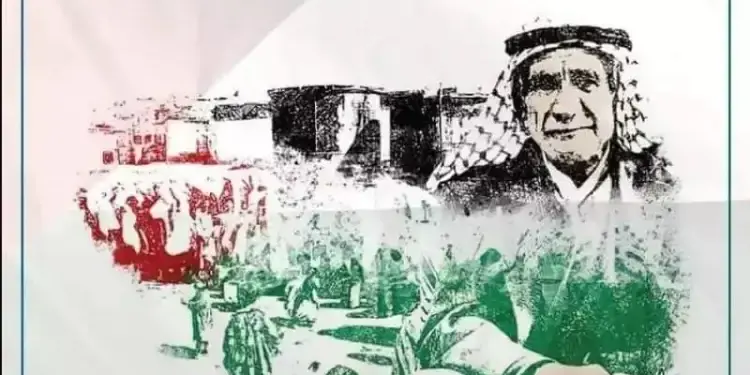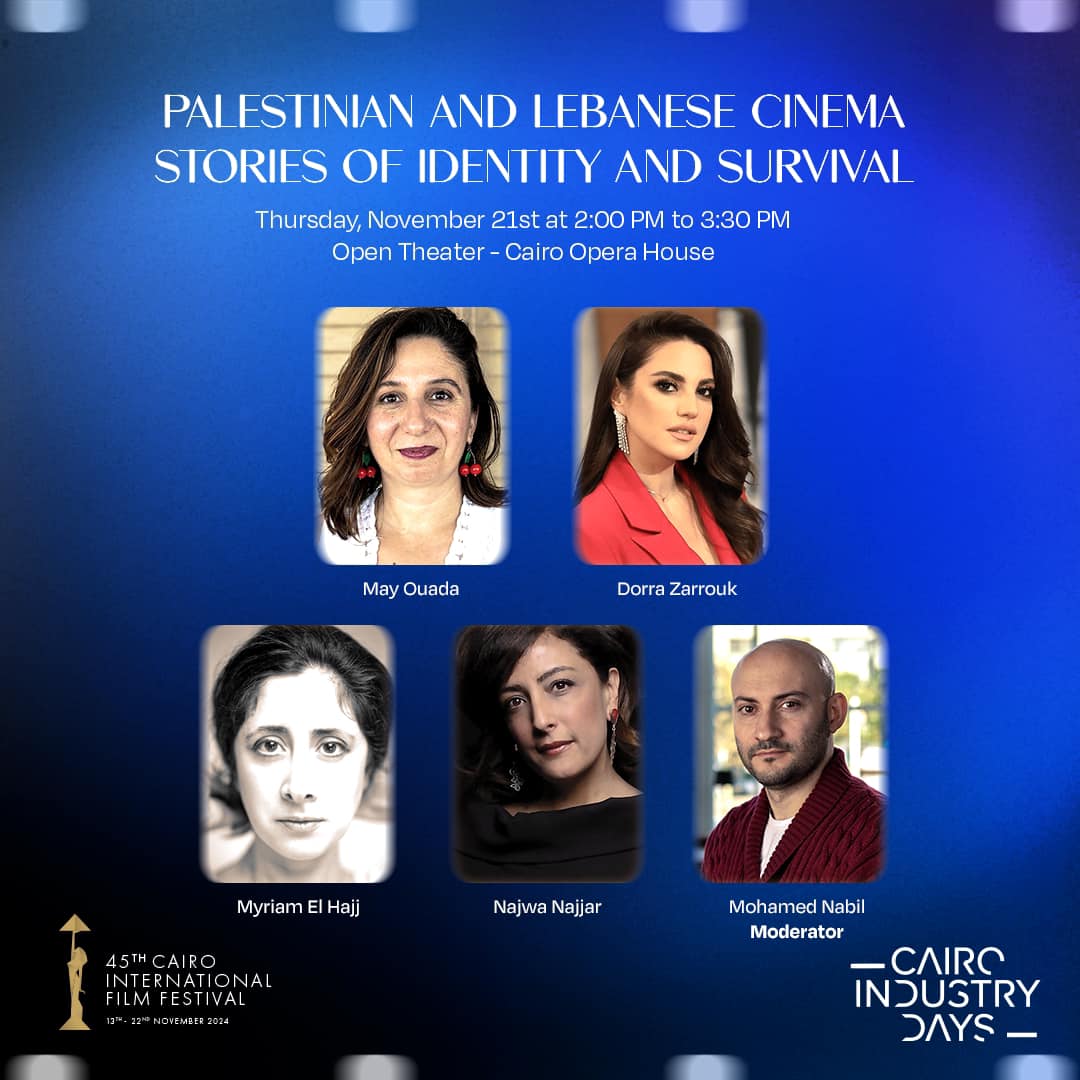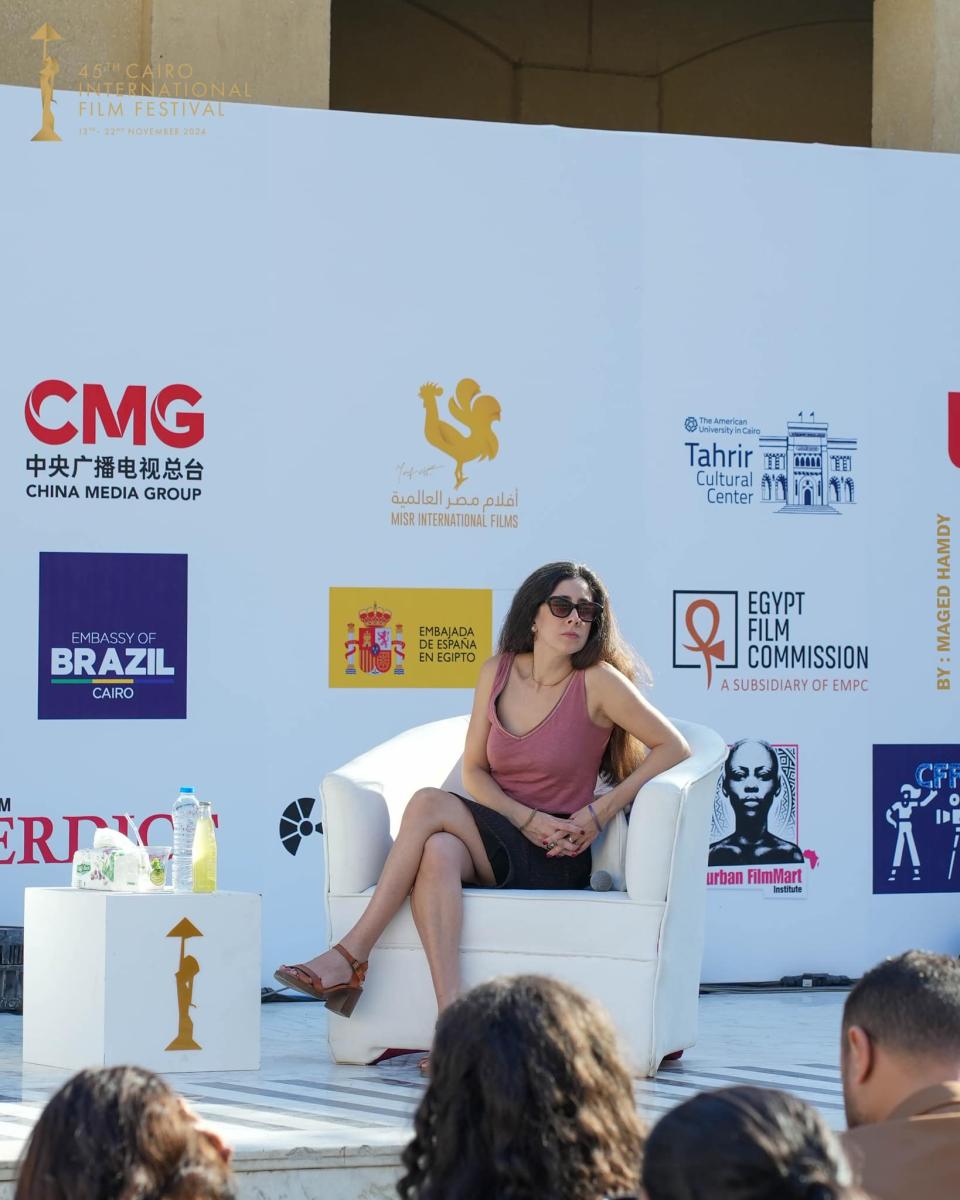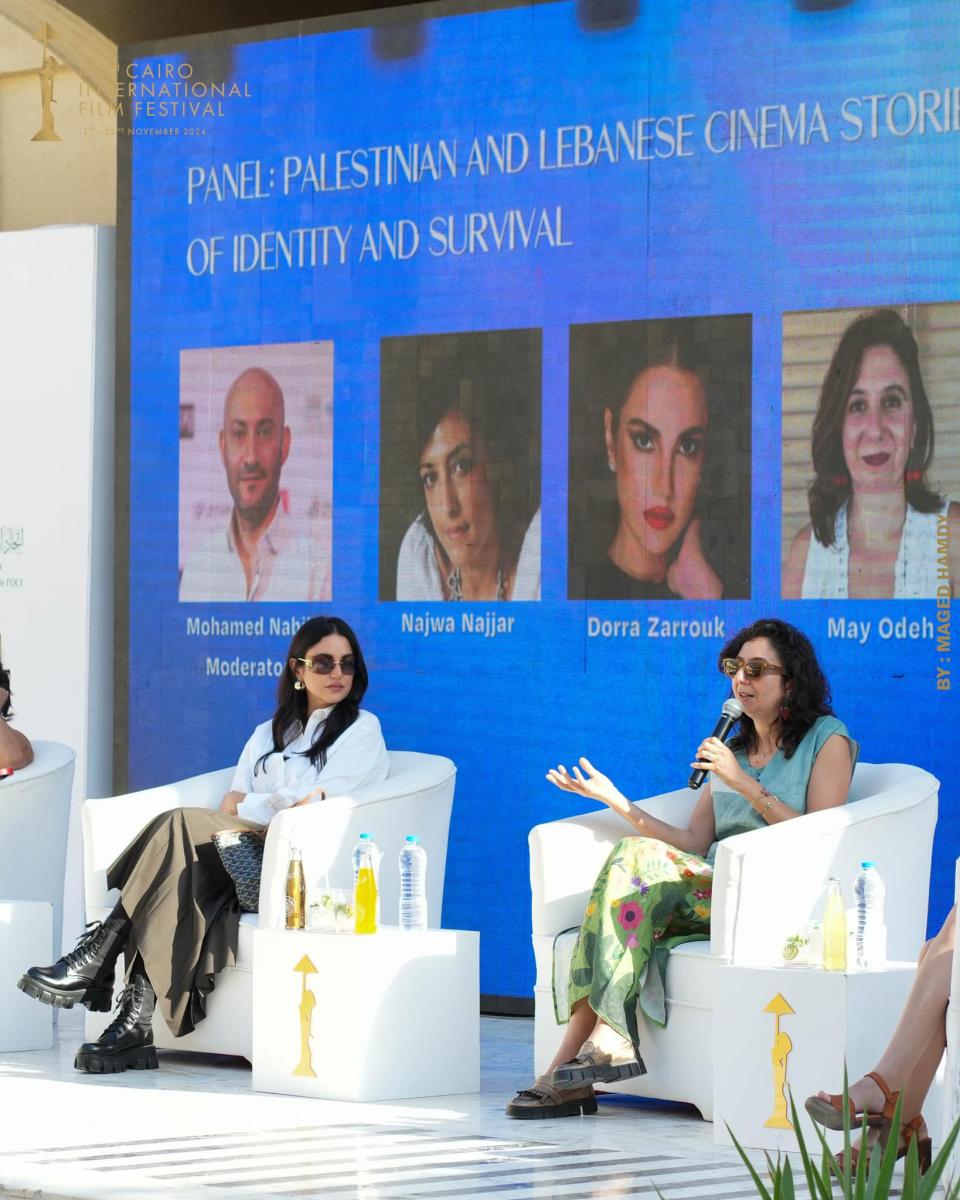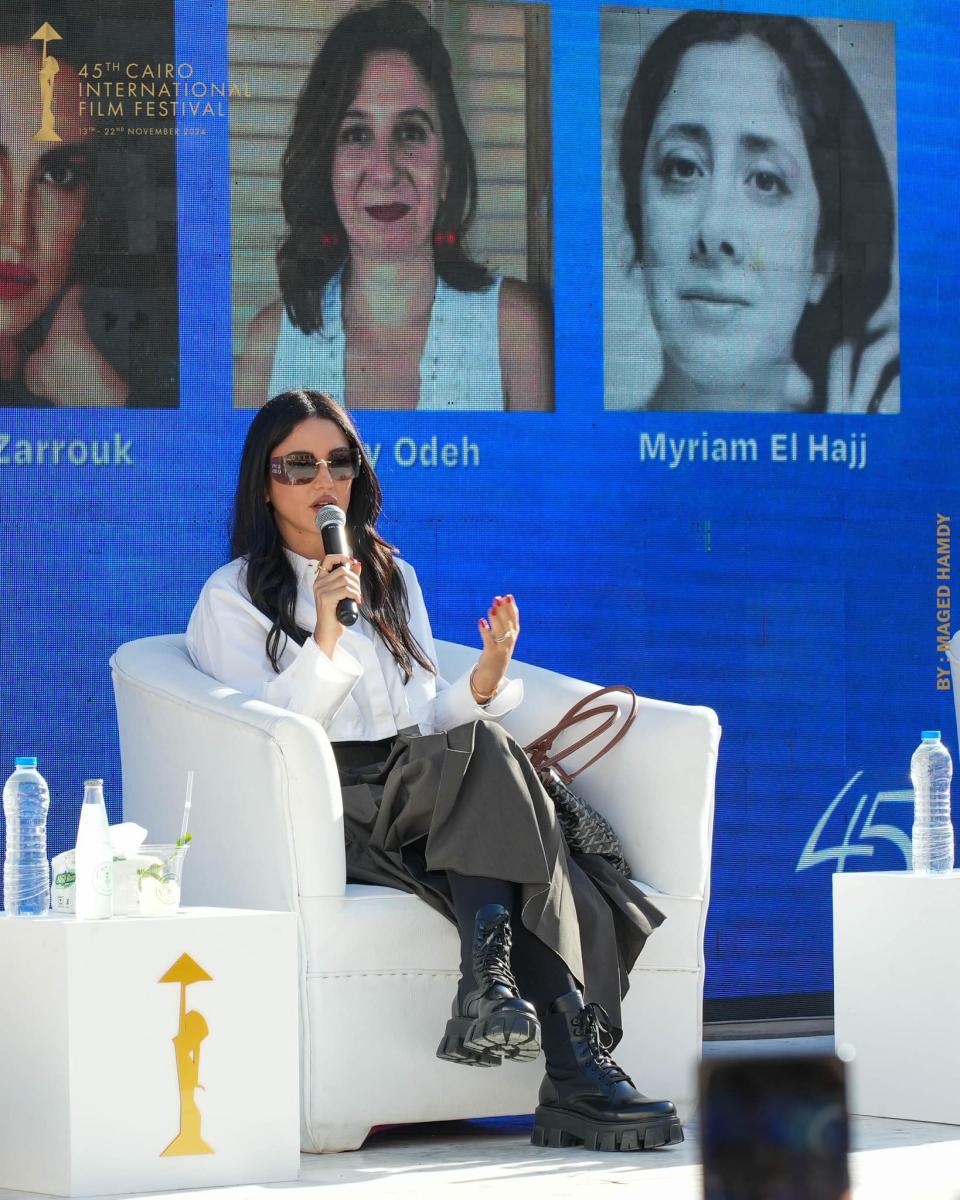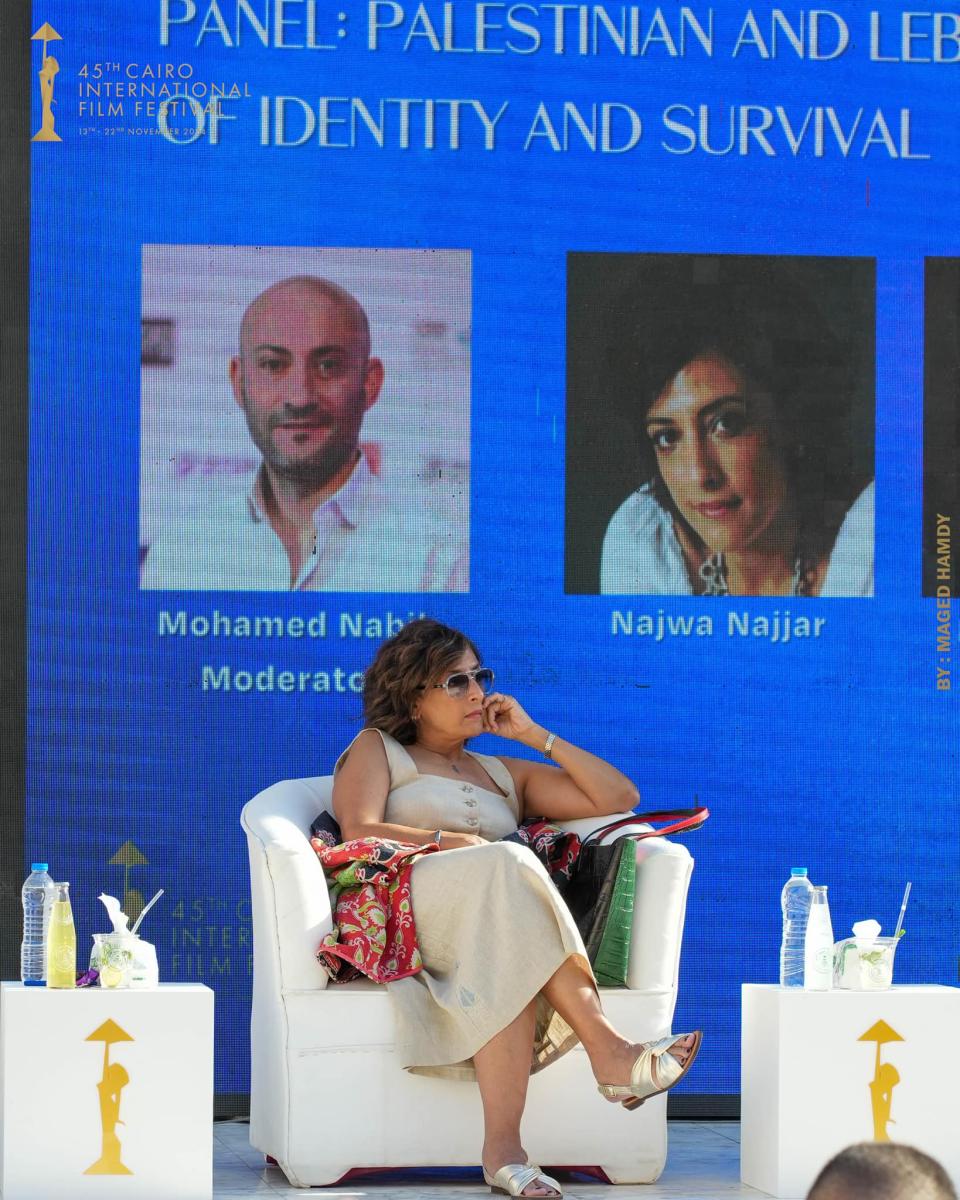During the 45ᵉ edition of the Cairo International Film Festival, which was held from November 13 to 22, 2024, a panel entitled “Palestinian and Lebanese cinema stories: identity and survival” gathered artists committed to explore how cinema becomes a cultural weapon in the face of oppression and biased narratives. This event, organized in solidarity with the Palestinian and Lebanese peoples, has made it possible to highlight the challenges and issues of these cinemas, which serve both acts of resistance and cultural preservation.
The moderator, Mohamed Nabil, introduced the four speakers: May OdehPalestinian producer, Dorra ZarroukTunisian actress recently gone to the documentary realization, Myriam El HajjLebanese director, and Najwa NajjarPalestinian director. Together, they explored the way in which cinema can preserve the stories and identities while reflecting the brutal realities of their respective regions.
The film festival as a space for expression and resistance
From the first minutes, the panelists expressed their gratitude to the Cairo International Film Festival for having maintained this discussion space. “” A canceled festival does not serve our cause “Said May Odeh. This remark echoed the cancellations of film festivals which occurred after October 7, 2023, decisions made in solidarity with Palestine but sometimes deemed counterproductive. “” These spaces allow us to meet the public and the international press, to make our voices heard and to tell our stories. »»
Panelists have unanimously stressed that Palestinian and Lebanese cinema is not just an art but a cultural weapon. Faced with biased Western narratives and erasure attempts, these films become living archives, carrying truths often ignored.
Myriam El Hajj: “relearn how to live”
Myriam El Hajj, whose documentary Beirut notebooks (2022) explores successive crises that have marked the life of Lebanese in recent years, including the explosion of the port of Beirut, shared a poignant anecdote a few hours before the panel.
“” I just called my father to get news. He said to me, ‘The house is shaking because of Israeli bombings.’ But then he added: ‘Your mother is in the kitchen, she makes a cake.’ ».
This sentence, both tragic and daily, has profoundly upset it. “” Abroad, this is called resilience, but I do not agree with this term. To say that the Lebanese are resilients is almost to justify that they continue to undergo as much violence. In reality, it is not resilience. My mother makes a cake to give herself an illusion of normality, to try to live when she has no other choice. It is not a sign of strength; It is a human and desperate response to an unbearable situation. »»
Myriam added that her documentary, although applaudi at festivals, is now overwhelmed by the gravity of the news. “” This film, shot in 2022, no longer has the same resonance today, in 2024. In the meantime, the situation in Lebanon has won to the point of making any attempt to tell our lives in their entirety. What is going on now exceeds everything I could have imagined. »»
May Odeh: “Cinema as an act of preservation”
One of the central ideas of the panel focused on the role of cinema as a tool for cultural resistance and construction of an authentic narrative. May Odeh, feature film producer 200 metersof which an extract has been projected, said:
“” Cinema is our only weapon to counter the biases of Western media. The colonist is not content to steal our land, it also modifies our history, our borders, our narrative. Our films then become documents that preserve our memory. »»
She denounced the financing of certain films by Zionist lobbies which distort Palestinian history, while stressing that the Palestinian filmmakers create authentic stories. “” Each film we make is a living archive that resists the erasure of our borders, our people, our identity. »»
“” When we are prevented from talking, it is as if we were prevented from existing. Palestinian and Lebanese filmmakers do not tell abstract stories. We are racing our lives, our losses, our victories, small or large. Our films are historical documents. Every minute of silence imposed is a minute stolen from history. »»
She also denounced what she considers the hypocrisy of the humanist values promoted by the West: ” Human rights, democracy … All this is for them only. We, Palestinians, are faced with duties with variable geometry. They want to submit to us, but through cinema, we write our story, with our words, our images. »»
Dorra Zarrouk: humanize Palestine by cinema
Dorra Zarrouk, Tunisian actress, made a poignant documentary on a Palestinian family who was refugee in Egypt. “” I grew up with the Palestinian cause “She explained. “” My goal was to show that the Palestinians are human, that they have dreams, ambitions, that they exist. »»
She discussed the challenges that these families face, recalling the universality of their experience. “” When I heard a Western saying that Palestine does not exist, I knew that this film should exist, to assert their presence, their humanity. »»
Asked about the risks that this project could take to her career, Dorra responded with serenity: ” If it costs me roles, too bad. But this film enriched me humanly. This is what matters. »»
Najwa Najjar: “Fight against stereotypes”
Najwa Najjar, Palestinian director, spoke of her film EYES OF THE THIEFof which an extract has been projected. “” It was an international co -production, but I remained faithful to my story. My partners did not intervene in my work. I chose to tell a true story, that of a 24 -year -old young man who pulled on 15 Israeli soldiers during the second intifada. He did not shoot civilians, but only on soldiers. He was not affiliated with any political movement, he was neither Hamas nor Fatah, he simply defended his family and his people. »»
Najwa Najjar denounced the ease with which the West produces films depicting the Palestinians as terrorists. “We refuse to tell their stories. Our cinema must reflect our reality, not their stereotypes. »»
She also stressed the importance of stars Khaled Abol Naga and Souad Massi, who participated in her film. “” Khaled is the first Arab superstar to have turned in the occupied territories, and Souad has brought a single sensitivity. These collaborations have strengthened the message from the film. »»
Najwa Najjar highlighted the difficulties encountered after making the film: “ Finding funding is one thing, but distribution is a nightmare. Our films are marginalized, even when selected at international festivals. »»
Najwa also shared a poignant anecdote on the Oscars: ” When the war in Gaza broke out, a member of the Academy of Oscars asked me to terminate my membership. I replied, ‘Who are we for you? When Ukraine was hit, you reacted immediately. Why nothing for us? Why are our films ignored, and why are we treated in your instances ? ‘ »»
New paths for distribution
Producer May Odeh stressed the importance of finding alternatives in the face of implicit censorship, the growing refusal of international funding and the difficulties of distributing Palestinian films. She presented the platform of the Palestinian film Institute, which broadcasts Palestinian films for free every week since 2020. “ In addition, since October 7, we have brought together films retracing Palestinian history since the 1970s. Each week, we record around 25,000 views, which proves that peoples want to hear our stories. »»
However, some stakeholders consider these figures insufficient. “” We must touch a wider audience to break the silence that surrounds our struggle “Said Najwa Najjar.
A necessary Arab Union
To conclude, the speakers unanimously called for stronger regional solidarity in order to reduce dependence on Western funding and to promote authentic cinematographic productions. “We have to tell our stories, and we have to do it ourselves and with integrity”summarized May Odeh.
This panel has highlighted the importance of preserving these stories through cinema, a tool which, in this context, is not content to tell stories, but becomes an essential weapon in a cultural and existential battle. “” As long as we have a camera, our voice will never silence. »»


